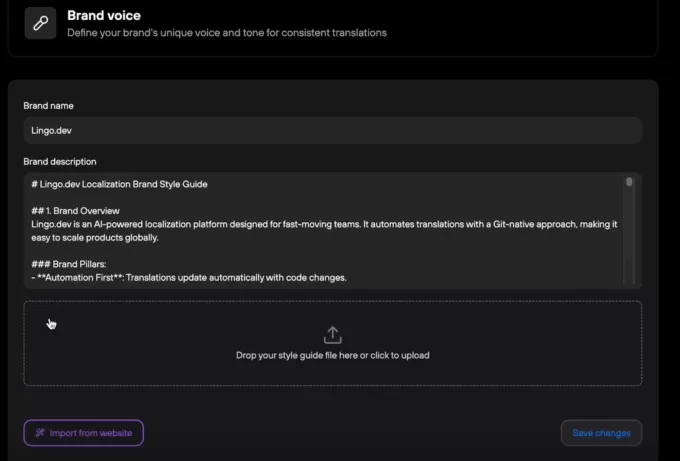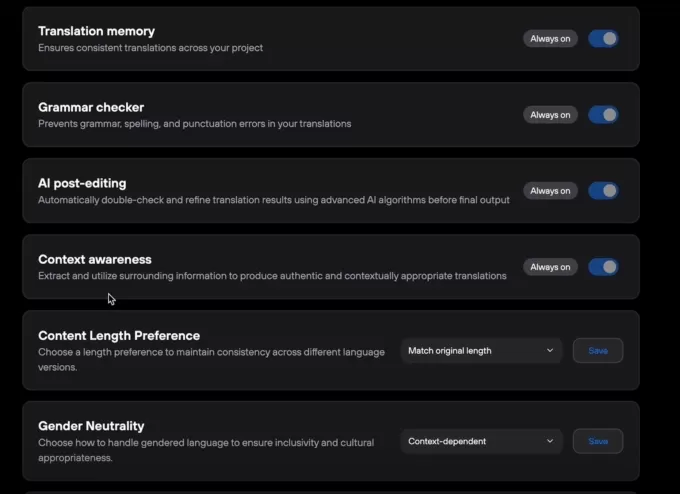Lingo.dev: App Localization Engine for Developers Unveiled
For folks who only speak one language but want to reach a global audience, things have never been simpler. Google Translate is a trusty tool that can whip up translations for images, audio, and whole websites across tons of languages. And let's not forget newer tech like ChatGPT, which is pretty handy for quick translations on the go.
Behind the scenes, companies like DeepL and ElevenLabs are making big bucks with their language tech, which other businesses can plug into their apps. But now, there's a new kid on the block: Lingo.dev. It's like a "Stripe" for app localization, helping developers make their apps speak different languages right from the start.
Lingo.dev, which used to be called Replexica, is all about making life easier for developers. They just need to focus on writing their code, and Lingo.dev takes care of the rest, automatically translating everything. No more messing around with ChatGPT for quick translations or juggling different translation files from various agencies.
Right now, Lingo.dev is working with clients like the French unicorn Mistral AI and the open-source Calendly competitor Cal.com. To keep growing, they've just nabbed $4.2 million in seed funding, led by Initialized Capital, with Y Combinator and a bunch of angel investors chipping in.
Found in Translation
Lingo.dev is the brainchild of CEO Max Prilutskiy and CPO Veronica Prilutskaya (check out the pic above). They sold their last SaaS startup, Notionlytics, last year and have been tinkering with Lingo.dev since 2023. They got their first paying customers after a hackathon at Cornell University and then joined Y Combinator's fall program.
At its heart, Lingo.dev is a Translation API that developers can use through their command line interface or by hooking it up to their CI/CD system via GitHub or GitLab. Whenever they make a code change, Lingo.dev sends them a pull request with the updated translations.
The magic happens with a bunch of large language models (LLMs) from places like Anthropic and OpenAI. Lingo.dev mixes and matches these models to get the best results for each job. "Different prompts work better in some models over others," Prilutskiy told TechCrunch. "Also, depending on the use case, we might want better latency, or latency might not matter at all."
Of course, with LLMs, data privacy is a big deal. Some businesses are hesitant to jump on the generative AI bandwagon because of it. But Lingo.dev focuses on translating front-end interfaces and business content like marketing sites and emails, without touching any personal identifiable information (PII). "We do not expect any personal data to be sent to us," Prilutskiy said.
With Lingo.dev, companies can build translation memories and upload their style guide to keep their brand voice consistent across different markets. They can also set rules for how certain phrases should be handled and make adjustments for things like text length, which can be a real headache when translating from English to German, for example.
[ttpp]
Lingo.dev: Building a brand voiceImage Credits:Lingo.dev [yyxx]
Lingo.dev also uses something called "context awareness" to understand the bigger picture when translating small bits of text, like labels on an interface. They're even working on a new feature that uses screenshots of the app's UI to get more context.
[ttpp]
Lingo.dev dashboardImage Credits:Lingo.dev [yyxx]
Going Local
Lingo.dev is still pretty new to the whole localization game. They don't handle things like colors and symbols, which can mean different things in different cultures. And stuff like metric/imperial conversions still needs to be dealt with at the code level.
But they do support the MessageFormat framework, which helps with pluralization and gender-specific phrasing. They've also got an experimental beta feature for idioms, like translating "to kill two birds with one stone" into German as "to hit two flies with one swat."
Lingo.dev is also doing some cool AI research to make the localization process even better. "One of the complex tasks we're currently working on is preserving feminine/masculine versions of nouns and verbs when translating between languages," Prilutskiy said. "Different languages encode different amounts of information. For example, the word 'teacher' in English is gender-neutral, but in Spanish it's either 'maestro' (male) or 'maestra' (female). Making sure these nuances are preserved correctly falls under our applied AI research efforts."
The big goal for Lingo.dev is to make localization so easy that it becomes a natural part of the tech stack, just like how Stripe made online payments a breeze. "Overall, the [goal] with Lingo.dev is to eliminate friction from localization so thoroughly, that it becomes an infrastructure layer and natural part of the tech stack," Prilutskiy said.
The founders, who were recently based in Barcelona, are now moving to San Francisco. Lingo.dev is a lean operation with just three employees, including a founding engineer. They're big believers in keeping things lean, just like they did with their last startup, Notionlytics, which was entirely bootstrapped and had no employees beyond Max and Veronica. "We were two people, full time, but with some contractors for various things now and then," Prilutskiy added. "But we know how to build things with minimal resources. Because the previous company was bootstrapped, so we had to find a way for that to work. And we are replicating the same lean style — but now with funding."
Related article
 Manus Debuts 'Wide Research' AI Tool with 100+ Agents for Web Scraping
Chinese AI innovator Manus, which previously gained attention for its pioneering multi-agent orchestration platform catering to both consumers and professional users, has unveiled a groundbreaking application of its technology that challenges convent
Manus Debuts 'Wide Research' AI Tool with 100+ Agents for Web Scraping
Chinese AI innovator Manus, which previously gained attention for its pioneering multi-agent orchestration platform catering to both consumers and professional users, has unveiled a groundbreaking application of its technology that challenges convent
 Why LLMs Ignore Instructions & How to Fix It Effectively
Understanding Why Large Language Models Skip Instructions
Large Language Models (LLMs) have transformed how we interact with AI, enabling advanced applications ranging from conversational interfaces to automated content generation and programming ass
Why LLMs Ignore Instructions & How to Fix It Effectively
Understanding Why Large Language Models Skip Instructions
Large Language Models (LLMs) have transformed how we interact with AI, enabling advanced applications ranging from conversational interfaces to automated content generation and programming ass
 Pebble Reclaims Its Original Brand Name After Legal Battle
The Return of Pebble: Name and AllPebble enthusiasts can rejoice - the beloved smartwatch brand isn't just making a comeback, it's reclaiming its iconic name. "We've successfully regained the Pebble trademark, which honestly surprised me with how smo
Comments (28)
0/200
Pebble Reclaims Its Original Brand Name After Legal Battle
The Return of Pebble: Name and AllPebble enthusiasts can rejoice - the beloved smartwatch brand isn't just making a comeback, it's reclaiming its iconic name. "We've successfully regained the Pebble trademark, which honestly surprised me with how smo
Comments (28)
0/200
![JoseJackson]() JoseJackson
JoseJackson
 August 25, 2025 at 1:33:49 AM EDT
August 25, 2025 at 1:33:49 AM EDT
This localization engine sounds like a game-changer for devs! No more juggling clunky translation files—Lingo.dev seems to streamline everything. Excited to see how it stacks up against Google Translate in real-world apps. 🚀


 0
0
![DouglasMartinez]() DouglasMartinez
DouglasMartinez
 August 17, 2025 at 9:01:03 PM EDT
August 17, 2025 at 9:01:03 PM EDT
This localization engine sounds like a game-changer for devs! 🚀 Translating apps globally just got easier, but I wonder how it stacks up against giants like Google Translate. Anyone tried it yet?


 0
0
![EricPerez]() EricPerez
EricPerez
 August 12, 2025 at 11:00:59 AM EDT
August 12, 2025 at 11:00:59 AM EDT
This localization engine sounds like a game-changer for devs! 😎 I’ve struggled with clunky translation tools before, so I’m curious—how does Lingo.dev stack up against Google Translate for accuracy? Anyone tried it yet?


 0
0
![CharlesLee]() CharlesLee
CharlesLee
 April 20, 2025 at 2:36:07 AM EDT
April 20, 2025 at 2:36:07 AM EDT
Lingo.dev é uma mão na roda para desenvolvedores que querem alcançar um público global. É fácil de usar e se integra bem ao meu fluxo de trabalho. Só queria que tivesse mais opções de idiomas, mas já é um bom começo! 👌


 0
0
![ScottMartinez]() ScottMartinez
ScottMartinez
 April 17, 2025 at 11:20:43 PM EDT
April 17, 2025 at 11:20:43 PM EDT
Lingo.dev ist ein wahres Geschenk für Entwickler, die global gehen wollen. Es ist super einfach zu bedienen und passt perfekt in meinen Arbeitsablauf. Schade, dass es nicht mehr Sprachoptionen gibt, aber es ist ein guter Start! 😊


 0
0
![MiaDavis]() MiaDavis
MiaDavis
 April 17, 2025 at 2:34:52 PM EDT
April 17, 2025 at 2:34:52 PM EDT
Lingo.dev 덕분에 앱 로컬라이제이션이 정말 쉬워졌어요! 개발자로서 번역이 정확해서 도움이 많이 됩니다. 다만, 슬랭 표현이 조금 어색할 때가 있어요. 그래도 시간을 많이 절약할 수 있어서 글로벌 진출을 생각하는 분들께 추천해요! 😊


 0
0
For folks who only speak one language but want to reach a global audience, things have never been simpler. Google Translate is a trusty tool that can whip up translations for images, audio, and whole websites across tons of languages. And let's not forget newer tech like ChatGPT, which is pretty handy for quick translations on the go.
Behind the scenes, companies like DeepL and ElevenLabs are making big bucks with their language tech, which other businesses can plug into their apps. But now, there's a new kid on the block: Lingo.dev. It's like a "Stripe" for app localization, helping developers make their apps speak different languages right from the start.
Lingo.dev, which used to be called Replexica, is all about making life easier for developers. They just need to focus on writing their code, and Lingo.dev takes care of the rest, automatically translating everything. No more messing around with ChatGPT for quick translations or juggling different translation files from various agencies.
Right now, Lingo.dev is working with clients like the French unicorn Mistral AI and the open-source Calendly competitor Cal.com. To keep growing, they've just nabbed $4.2 million in seed funding, led by Initialized Capital, with Y Combinator and a bunch of angel investors chipping in.
Found in Translation
Lingo.dev is the brainchild of CEO Max Prilutskiy and CPO Veronica Prilutskaya (check out the pic above). They sold their last SaaS startup, Notionlytics, last year and have been tinkering with Lingo.dev since 2023. They got their first paying customers after a hackathon at Cornell University and then joined Y Combinator's fall program.
At its heart, Lingo.dev is a Translation API that developers can use through their command line interface or by hooking it up to their CI/CD system via GitHub or GitLab. Whenever they make a code change, Lingo.dev sends them a pull request with the updated translations.
The magic happens with a bunch of large language models (LLMs) from places like Anthropic and OpenAI. Lingo.dev mixes and matches these models to get the best results for each job. "Different prompts work better in some models over others," Prilutskiy told TechCrunch. "Also, depending on the use case, we might want better latency, or latency might not matter at all."
Of course, with LLMs, data privacy is a big deal. Some businesses are hesitant to jump on the generative AI bandwagon because of it. But Lingo.dev focuses on translating front-end interfaces and business content like marketing sites and emails, without touching any personal identifiable information (PII). "We do not expect any personal data to be sent to us," Prilutskiy said.
With Lingo.dev, companies can build translation memories and upload their style guide to keep their brand voice consistent across different markets. They can also set rules for how certain phrases should be handled and make adjustments for things like text length, which can be a real headache when translating from English to German, for example.
[ttpp]
Lingo.dev also uses something called "context awareness" to understand the bigger picture when translating small bits of text, like labels on an interface. They're even working on a new feature that uses screenshots of the app's UI to get more context.
[ttpp]
Going Local
Lingo.dev is still pretty new to the whole localization game. They don't handle things like colors and symbols, which can mean different things in different cultures. And stuff like metric/imperial conversions still needs to be dealt with at the code level.
But they do support the MessageFormat framework, which helps with pluralization and gender-specific phrasing. They've also got an experimental beta feature for idioms, like translating "to kill two birds with one stone" into German as "to hit two flies with one swat."
Lingo.dev is also doing some cool AI research to make the localization process even better. "One of the complex tasks we're currently working on is preserving feminine/masculine versions of nouns and verbs when translating between languages," Prilutskiy said. "Different languages encode different amounts of information. For example, the word 'teacher' in English is gender-neutral, but in Spanish it's either 'maestro' (male) or 'maestra' (female). Making sure these nuances are preserved correctly falls under our applied AI research efforts."
The big goal for Lingo.dev is to make localization so easy that it becomes a natural part of the tech stack, just like how Stripe made online payments a breeze. "Overall, the [goal] with Lingo.dev is to eliminate friction from localization so thoroughly, that it becomes an infrastructure layer and natural part of the tech stack," Prilutskiy said.
The founders, who were recently based in Barcelona, are now moving to San Francisco. Lingo.dev is a lean operation with just three employees, including a founding engineer. They're big believers in keeping things lean, just like they did with their last startup, Notionlytics, which was entirely bootstrapped and had no employees beyond Max and Veronica. "We were two people, full time, but with some contractors for various things now and then," Prilutskiy added. "But we know how to build things with minimal resources. Because the previous company was bootstrapped, so we had to find a way for that to work. And we are replicating the same lean style — but now with funding."
 Manus Debuts 'Wide Research' AI Tool with 100+ Agents for Web Scraping
Chinese AI innovator Manus, which previously gained attention for its pioneering multi-agent orchestration platform catering to both consumers and professional users, has unveiled a groundbreaking application of its technology that challenges convent
Manus Debuts 'Wide Research' AI Tool with 100+ Agents for Web Scraping
Chinese AI innovator Manus, which previously gained attention for its pioneering multi-agent orchestration platform catering to both consumers and professional users, has unveiled a groundbreaking application of its technology that challenges convent
 Why LLMs Ignore Instructions & How to Fix It Effectively
Understanding Why Large Language Models Skip Instructions
Large Language Models (LLMs) have transformed how we interact with AI, enabling advanced applications ranging from conversational interfaces to automated content generation and programming ass
Why LLMs Ignore Instructions & How to Fix It Effectively
Understanding Why Large Language Models Skip Instructions
Large Language Models (LLMs) have transformed how we interact with AI, enabling advanced applications ranging from conversational interfaces to automated content generation and programming ass
 Pebble Reclaims Its Original Brand Name After Legal Battle
The Return of Pebble: Name and AllPebble enthusiasts can rejoice - the beloved smartwatch brand isn't just making a comeback, it's reclaiming its iconic name. "We've successfully regained the Pebble trademark, which honestly surprised me with how smo
Pebble Reclaims Its Original Brand Name After Legal Battle
The Return of Pebble: Name and AllPebble enthusiasts can rejoice - the beloved smartwatch brand isn't just making a comeback, it's reclaiming its iconic name. "We've successfully regained the Pebble trademark, which honestly surprised me with how smo
 August 25, 2025 at 1:33:49 AM EDT
August 25, 2025 at 1:33:49 AM EDT
This localization engine sounds like a game-changer for devs! No more juggling clunky translation files—Lingo.dev seems to streamline everything. Excited to see how it stacks up against Google Translate in real-world apps. 🚀


 0
0
 August 17, 2025 at 9:01:03 PM EDT
August 17, 2025 at 9:01:03 PM EDT
This localization engine sounds like a game-changer for devs! 🚀 Translating apps globally just got easier, but I wonder how it stacks up against giants like Google Translate. Anyone tried it yet?


 0
0
 August 12, 2025 at 11:00:59 AM EDT
August 12, 2025 at 11:00:59 AM EDT
This localization engine sounds like a game-changer for devs! 😎 I’ve struggled with clunky translation tools before, so I’m curious—how does Lingo.dev stack up against Google Translate for accuracy? Anyone tried it yet?


 0
0
 April 20, 2025 at 2:36:07 AM EDT
April 20, 2025 at 2:36:07 AM EDT
Lingo.dev é uma mão na roda para desenvolvedores que querem alcançar um público global. É fácil de usar e se integra bem ao meu fluxo de trabalho. Só queria que tivesse mais opções de idiomas, mas já é um bom começo! 👌


 0
0
 April 17, 2025 at 11:20:43 PM EDT
April 17, 2025 at 11:20:43 PM EDT
Lingo.dev ist ein wahres Geschenk für Entwickler, die global gehen wollen. Es ist super einfach zu bedienen und passt perfekt in meinen Arbeitsablauf. Schade, dass es nicht mehr Sprachoptionen gibt, aber es ist ein guter Start! 😊


 0
0
 April 17, 2025 at 2:34:52 PM EDT
April 17, 2025 at 2:34:52 PM EDT
Lingo.dev 덕분에 앱 로컬라이제이션이 정말 쉬워졌어요! 개발자로서 번역이 정확해서 도움이 많이 됩니다. 다만, 슬랭 표현이 조금 어색할 때가 있어요. 그래도 시간을 많이 절약할 수 있어서 글로벌 진출을 생각하는 분들께 추천해요! 😊


 0
0





























